Interview with Debbie Russell
 It always amazes me how much we grow in midlife. Debbie Russell learned several intergenerational family secrets at 51, which helped her to understand herself and her family better and move forward in her life in ways that bring her both “purpose and joy.” To our great benefit, Debbie has documented her journey in a memoir coming out later this month (and available right now for preorder)! It was a great pleasure to speak with Debbie about that journey.
It always amazes me how much we grow in midlife. Debbie Russell learned several intergenerational family secrets at 51, which helped her to understand herself and her family better and move forward in her life in ways that bring her both “purpose and joy.” To our great benefit, Debbie has documented her journey in a memoir coming out later this month (and available right now for preorder)! It was a great pleasure to speak with Debbie about that journey.
Diane: Debbie Russell, welcome! I’m so excited to talk to you today. You went from a high-profile prosecuting attorney to writing full time. I love your book Crossing Fifty-One:Not Quite a Memoir!
Can you tell us how you came to write it?
Debbie: This book was born from a file folder of letters I found back in 2005 that my grandfather had asked the family to keep when he went into a four-month-long drug rehabilitation center. Back then, I thought those letters and the story contained within them—about a family rallying together around a father who had an addiction—was a strong story in and of itself. My original intent was to make those letters into some kind of a non-fiction book. But as life went on, and as my own father—who was the son in the original story—started his decline from Parkinson’s, I began to see things differently. I saw these two family stories becoming my story, if that makes sense.
Diane: It does. When you first found those letters, it must have felt like discovering your own 23andMe. What did learning about your roots do for you?
“One of the Things That Struck Me About My Grandfather Was How Brave He Seemed”
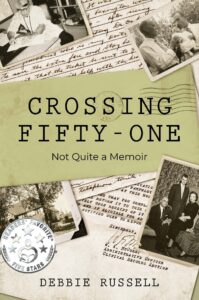 Debbie: It helped me to understand the genetics around who I am. 23andMe is one way we learn about our genetic makeup, but I also think personality is huge. The question of nature vs. nurture always arises. One of the things that struck me about my grandfather was how brave he seemed, how he approached this voluntary lockup situation—he just went ahead and did it. But one could also say it was very impulsive and selfish. Then, how the family around him—his wife, my grandmother, and then of course my dad, the oldest son—interacted with each other in such a supportive way, I found very different from my own family. Living within my own family unit was very, very challenging.
Debbie: It helped me to understand the genetics around who I am. 23andMe is one way we learn about our genetic makeup, but I also think personality is huge. The question of nature vs. nurture always arises. One of the things that struck me about my grandfather was how brave he seemed, how he approached this voluntary lockup situation—he just went ahead and did it. But one could also say it was very impulsive and selfish. Then, how the family around him—his wife, my grandmother, and then of course my dad, the oldest son—interacted with each other in such a supportive way, I found very different from my own family. Living within my own family unit was very, very challenging.
Diane: One of the things I found so poignant in the book was how, when you were reading the letters, it felt somewhat disorienting. You couldn’t wrap your head around the fact that a family could be so supportive, especially under great stress. While you were certainly hungry to learn about your roots, you also wanted to learn how families like this work. And in the beginning, you were skeptical about your father’s family.
So let’s talk about your mom a little bit. Your mom has what you believe to be borderline personality disorder. It’s extremely difficult to be the child of a parent who presents with borderline personality disorder characteristics.
Debbie: Sure. Things really started making sense to me when I shared some of my family experiences with a good friend who had a similar mother. I remember her recommending the book Walking on Eggshells, which might be the seminal book on borderline personality disorder. I ultimately bought the book Understanding the Borderline Mother.
“It May Not Be As Obvious As Physical Abuse, But It Certainly Is Insidious”
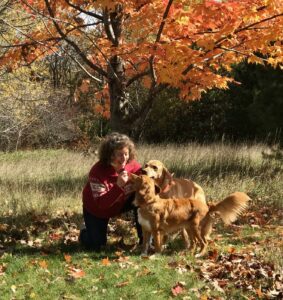 When I read it, it was as though after all these years—I was 51 at that point—I finally understood. I was reading about all the experiences that I’d had as a child. There was this whole wave of relief. I probably exhaled over and over and over, my gosh, this is actually real—and there’s nothing fundamentally wrong with me. I’ve even joined a Facebook group called “Daughters of Mothers Who Have Borderline Personality Disorder” and it’s been incredibly validating.
When I read it, it was as though after all these years—I was 51 at that point—I finally understood. I was reading about all the experiences that I’d had as a child. There was this whole wave of relief. I probably exhaled over and over and over, my gosh, this is actually real—and there’s nothing fundamentally wrong with me. I’ve even joined a Facebook group called “Daughters of Mothers Who Have Borderline Personality Disorder” and it’s been incredibly validating.
My mom’s favorite phrase was, “There’s just something off about you.” And I’d have to remind myself that I’ve kept the same job. I’m good at my job. I have friends. I’ve come to learn that her talking to me like that is actually a form of abuse. It may not be as obvious as physical abuse, but it certainly is insidious.
And I attribute my success to the fact that my dad did the job of both parents.
Diane: You write about how important control was for you. When you have a parent dealing with significant stress or mental health challenges, many of their responses to you may not be directly related to what you actually did but to what state of mind they’re in.
As a child, you have no control over your parents’ responses, so you often try to control whatever parts of the environment you can.
Debbie: Absolutely. With somebody like my mother, there was no knowing how anything was ever going to turn out because her mood would be different, and there’d be no way to predict. So, my response then was to try to control things myself, so I’d be certain of the outcome.
Diane: How did that work for you, Debbie?
Debbie: It worked until it didn’t.
“I Was a Very Black and White Thinker Back Then”
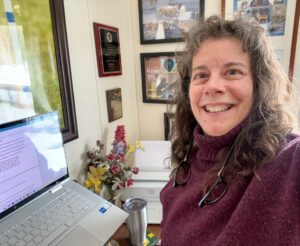 Diane: I think so many of us can relate to that feeling of wanting to control things when we’re in a situation that is really out of our control—like so much of life is. We feel, oh, if we can only control this, this, and that, the outcome should be within our control as well. It’s such a freedom when we finally realize that most outcomes are out of our hands.
Diane: I think so many of us can relate to that feeling of wanting to control things when we’re in a situation that is really out of our control—like so much of life is. We feel, oh, if we can only control this, this, and that, the outcome should be within our control as well. It’s such a freedom when we finally realize that most outcomes are out of our hands.
Can you talk a little bit about your life as a prosecutor? You mentioned that you were involved in a high-profile case.
Debbie: Yes. That’s going to be the topic of my next book! It was in 2012, so it’s quite some time ago. I’m in Minnesota. A former Minnesota Vikings football player, Joe Senser, retired and opened several restaurants in the area, and was very well-known and well-liked. His wife hit and killed somebody with her car. I was quite unprepared for the media attention, and up until our recent police murder cases, it was probably the highest profile case in the Minneapolis/St. Paul area.
I was always one who just kept my head down and focused on my cases. To have this one blow up the way it did and get the scrutiny it got … that was a test. I was very good back then at managing all of that. I’m learning about functional freeze and all of these other conditions and concepts that allowed me to survive my work. But now, I realize just how much conflict there always was as a prosecutor and how much I loved that conflict. I loved the fight. I was a very black and white thinker back then–a very zero-sum, win, lose, guilty, not guilty.
“I Felt Crossing Fifty-One Was a Good Way to Characterize This Period in My Life”
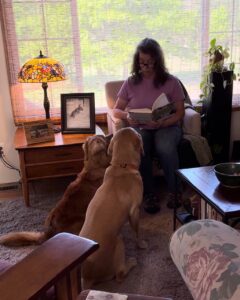 And I managed for a good solid 20 years until it all started to crumble. My ability to compartmentalize all of the awful things people do to each other, I just couldn’t do it anymore. It had clearly been eating away at me, but I hadn’t noticed—until I did. I think it coincided with my dad’s health failing.
And I managed for a good solid 20 years until it all started to crumble. My ability to compartmentalize all of the awful things people do to each other, I just couldn’t do it anymore. It had clearly been eating away at me, but I hadn’t noticed—until I did. I think it coincided with my dad’s health failing.
I’ll throw menopause in there too. You think, well, is it menopause? Is it this? Is it that? You just don’t know what hit you. That’s why I felt Crossing Fifty-One was a good way to characterize this period in my life, where I’m literally going from somebody who had all my ducks in a row and showed up every day and kicked butt, to somebody that could barely get myself to work. While I’m very grateful that I could do that work on behalf of crime victims and it suited me at that time, now I’m just happy to not be doing it anymore.
Diane: It’s so interesting what it takes to make us change. It sounds like you were hit with the perfect storm and anything less may not have been enough to motivate you to make the changes that allowed you to move in this more… I’m looking for the word … less compartmentalized life.
Debbie: I’ll give you a word!
Diane: Tell me.
Debbie: I would say peaceful.
Diane: Peaceful. Of course!
I see your book as a coming-of-age story. I believe that we pack several lifetimes in our brief time on this planet, each one with its own period during which we come of age.
“My Dogs Have Always Been My Greatest Non-Human Source of Joy”
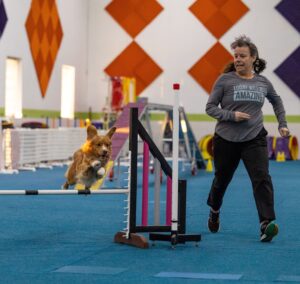 Debbie: I think midlife can be as challenging as any other life chapter because so many things change.
Debbie: I think midlife can be as challenging as any other life chapter because so many things change.
There are identity questions at midlife. Who are you? What are you? You’re trying to decide what you’re going to do in the next chapter.
I’ve found, there are many people who keep working, not because they need the money, but because that’s really the only thing that brings them purpose or value. I planned this—I’ll call it retirement— from my lawyer job for right when I turned 55, which was the earliest I could draw a pension. And it’s quite a small pension, but it was time.
I suspect the business of life coaching is probably going to get more robust as more of us are entering this period of our lives. We have a good couple of decades ahead of us, and how are we going to spend them?
To me, purpose and joy are the two critical pieces. I had a lot of purpose in my work, but I found my joy outside of work. My dogs have always been my greatest non-human source of joy. They tolerate all my moods and show me a fantastic way to approach life. Dog training allows me to think about things differently and work on non-verbal communication skills. Also, through my dogs, I’ve made many wonderful friends. Not to mention, they keep me active!
Diane: I love that now you have found purpose and joy in the same things. Which brings me to my next question about moving from the city to a rural area.
“I Needed to Craft a Story that People Were Drawn Into”
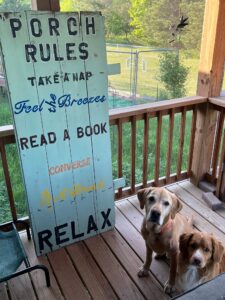 Debbie: Well, it continues to be an adventure. I look at this place and it’s my own little paradise. I love being outside and tending to the land. I love watching the birds. The writing comes so easily because I just look outside for ideas. Right now I’m working on a little piece about a hummingbird!
Debbie: Well, it continues to be an adventure. I look at this place and it’s my own little paradise. I love being outside and tending to the land. I love watching the birds. The writing comes so easily because I just look outside for ideas. Right now I’m working on a little piece about a hummingbird!
The commute for those few years that I was still working in Minneapolis took three hours out of my day. I drove to the train station, and I got on the train—for a total of an hour and half each way. But I used the time to work on the book. I picked up a creative nonfiction course through The Great Courses, and I’d watch the lessons on the train, on my little portable DVD player, and think, how do I write these sentences? How do I make these paragraphs? How do I write that cliffhanger at the end of each chapter that keeps people turning the page? So I made the most of that commute! I didn’t have a ton of formal training as a writer, but I knew I needed to craft a story that people were drawn into. I couldn’t just write, “this happened to me” and expect people to appreciate it.
Diane: I think it’s so important for us to hear how others take up something new. I’m sure as a lawyer you wrote briefs and all kinds of things, but memoir is a different type of writing.
I’m sure it was scary, but you did it anyway because you probably believed that you could or wanted it enough to try. And if it didn’t work, it didn’t work.
“I Always Believed the Story Was Going to Help People”
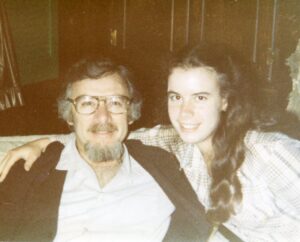 Debbie: At some point, while my dad was still alive, I told him, “I’m writing a book about all of this.” And he, of course–because this is how he was–said, “That’s great!”
Debbie: At some point, while my dad was still alive, I told him, “I’m writing a book about all of this.” And he, of course–because this is how he was–said, “That’s great!”
I’ve channeled my dad because he would always be the one, if I was struggling, to say, “you can do it.” With memoir, we share things and have to be vulnerable. And there are parts in there where I’m really vulnerable. Yet for some reason, I always believed the story was going to help people. People are going to see their own lives reflected in at least some part of it, and that gives a purpose to this book. This isn’t just me, or because I thought the story was sort of interesting. I believe all of this is useful in some way to people. That’s my hope anyway.
Diane: One of the hardest things memoirists must navigate is the writing about people who may not be happy with how they are portrayed. I am thinking mostly of your mother and, somewhat, your brother. Can you tell us about how that was for you?
Debbie: Being in therapy and learning about my mother’s behavior helped me to just write my truth. There’s a point later in the book where I realize that my dad understood my mother and brother much better than I did. Of course, I was one of the children, so could not have been expected to navigate my mother’s condition. Through therapy I’ve learned to accept that my relationships with both my mom and my brother are what they are and wishing they were different gets me nowhere.
My mother doesn’t know about the book. I sent my brother the manuscript last fall and have not heard from him about it.
“Suddenly, These Secrets About His Addiction Are Going to Be Out in the World”
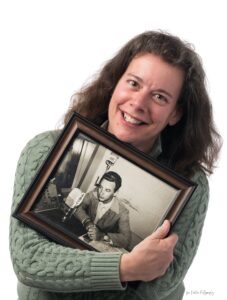 Diane: We all have family struggles and challenging personalities in our families.
Diane: We all have family struggles and challenging personalities in our families.
And there’s so much in Crossing Fifty-One about connecting to our ancestors, about what happens when a parent is declining. And what happens when we are ready to make a huge change in our lives.
I think it’s really special that your father supported you in writing this book, because I know his family kept secrets as many others do. You learn these secrets from the letters your read. I’m so glad you found these letters.
What do you think might be the biggest takeaway you got? What was the legacy of these letters for you in your life?
Debbie: To tie back to family secrets, when I informed my aunt Ann five or six years ago about my intention to write the book, she said “great, good for you.” I interviewed her as part of my research and kept her in the loop all along. When I was submitting it to publishers about a year ago, I asked her if she wanted to read it and her response was, “Will I be embarrassed by it?”
She was just about to turn 85, and she’s lived in pretty much the same place where she grew up. She’s very closely connected with the community in which my grandfather practiced and was well known as a doctor and a surgeon. And suddenly, these secrets about his addiction are going to be out in the world.
I sent her the final version that will be published this month. She read it in several days and just loves it.
“I’ve Discovered That My Grandfather, Whom I Never Knew, is Quite Possibly the Second-Biggest Influence in My Life”
She’s going to be my partner in some events that we’re doing in San Diego in August. What I think is so remarkable is that she is from the generation of the secrets, from “we don’t tell these things.” She has really changed her perspective on that experience.
Through the letters, I’ve discovered that my grandfather, whom I never knew, is quite possibly the second-biggest influence in my life, second only to my father. Just to be able to change your perspective, change how you frame an incident that at the time may have felt shameful, painful. To me, the takeaway from these letters is that this is something to be celebrated, and I am proud to be able to do this on behalf of my dad and my grandfather.
Diane: That’s wonderful. I love that the truth is something to be celebrated. And it is. There’s a lot of pain in this book, but it’s full of deep love.
As always, I’d love to hear from you. Please write a comment or send me an email.
See you soon!
XOXOXO
Diane

For one-on-one support in uncovering your voice on the page, please consider working with me! I’d love to join you on your journey!



Thank you Terry for sharing this with me and recommending that I read it.
As a woman who has been through a lot in my life. This is truly inspirational. Thank you Debbie for sharing your story. I can’t wait to read your memoir.
Thank you, Christina, for reading and sharing. Debbie is an inspiration! You will love her book!
Love this interview Diane! It’s filled
Intrigue and inspiration. Debbie is brave and vulnerable – and a way-shower for those of us who are seekers and hope to be finders of the Truth. Capital T kinda truth. Your interview questions are brilliant. Thank you. 🩷🩷🩷
Thank you Terry, you Truth finder you!!!
I agree, Terry! It was a wonderful conversation, and I’m so grateful to Diane for sharing my story!
So grateful, Debbie, that you shared it with us!!
Diane – THIS: “I believe that we pack several lifetimes in our brief time on this planet, each one with its own period during which we come of age.” And Debbie, thank you for your courage. As a memoirist, I understand the pain of family not responding and/or with whom you cannot share your writing safely. Your story will be a gift to so many. Can’t wait to read it.
Thank you, Sherry. From one whose story is a gift to others to another–so glad you and Debbie are connecting here!!
Thank you so much, Sherry! I appreciate your comment.
What an interesting interview! I’m so taken with the idea of someone you never met (Debbie’s grandfather) becoming one of the most important influences in her life – this resonates deeply with me. XO
Thanks, Alison! It fascinates me, how our ancestors live inside us and often we don’t even know.
Hi Alison, thanks so much for your comment! The connection I’ve felt to my grandfather is really profound!
My goodness, secrets are important. How special that Debbie could see her grandfather bravely fighting addiction and being a good man. Separating people and problems may be key in understanding others.
Thanks so much for the comment, Greta! “Separating people and problems” I think is the key and so often our greatest challenge!
Thanks for reading, Greta! My sense of my grandfather really changed, the more I learned about him from my dad and my aunt.
What a great interview! I can’t wait to read this memoir. I love the family involvement piece and the actual folder that went into this writing.
Thanks, Nicky! The book is quite a journey! I think you’ll really appreciate it–and I’d love to hear what you think Freud would say!!
Yay! Thanks for your comment, Nicky. I think you’ll enjoy it.